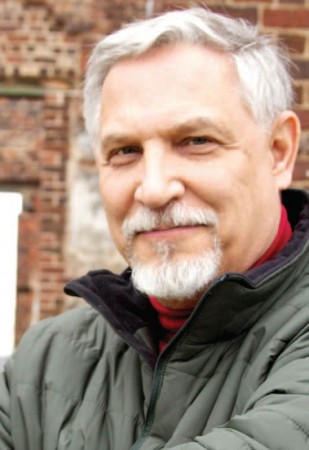David Schnare ’70
Success to David Schnare ’70, director of the Center for Environmental Stewardship at the Thomas Jefferson Institute, is “following your bliss,” he says. “It took three decades before I was able to take that step, but, once taken, one doesn’t look back.”
 Schnare filled a need for Cornell as a quality backstroke swimmer, while the school provided him with a place to look into many interests. Lifelong inspiration came from chemistry Professor Bill Deskin, whom David credits as being one of three people he considers “the authors of any success I have had.”
Schnare filled a need for Cornell as a quality backstroke swimmer, while the school provided him with a place to look into many interests. Lifelong inspiration came from chemistry Professor Bill Deskin, whom David credits as being one of three people he considers “the authors of any success I have had.”
Serendipity brought him to environmental work. After Cornell, Schnare served in the Navy, where he followed a course of self-study on the environmental movement as well as economics. This led to a master’s degree in public health and a Ph.D. in environmental management from the University of North Carolina-Chapel Hill, “and a graduate degree in college basketball fandom,” he says.
After 20 years trying to write economically sensible environmental rules, Schnare was moved to the enforcement offices at the U.S. EPA. “Lawyers don’t listen to non-lawyers, so I got a law degree,” he says. “It was love at first sight.” After 37 years, he left the federal establishment and aimed his work toward public interest law, “taking cases that force the government to be transparent, honest, and sensible.”
Serving also as director of the Environmental Law Center of the American Tradition Institute and director of the Free Market Environmental Law Clinic, he finds endless opportunities to serve those who otherwise “could not participate in this grand experiment we call government by the people.”
A career focused around the environment has brought him to a stoic stance. “Environmental issues have become the center of more policy issues than they should,” he says. “What we need is a return to stewardship values where we balance all the needs of the community-society-state-estate. Environmental activism has pulled the society apart, not brought it together. We have come a very long way since 1960 and each increment of additional so-called environmental improvement we now take has associated with it a very high opportunity cost. We cannot now afford to spend jobs and create poverty on the altar of an environmental religion. As a nation and a civilization, we are not that wealthy.”
As a student throughout his life, Schnare values intellectual and personal freedom.
“College is that first great step into freedom and personal responsibility. Cornell provided the stable, safe, and challenging place that allowed us to expand as persons, to look beyond horizons and to let the expectations of our past associations slide to the ground and leave us unfettered to wander around long enough to find a path to follow.”
A lifelong fan of Merner Hall, Schnare did need to find some areas of quiet for study space.
“The Dean of Student Affairs once concluded that The Commons need not be open past 10 p.m. as the corn fields were available as an alternative. Yes, he actually said that!” Schnare recalls. “I studied in the Chem building library, the old Carnegie library building. The quiet of the library stacks and the smell of acetone seemed to give me the best study space.”
The word profound inspires some reflection for this Cornellian.
“I have sat before bar in the Supreme Court of the United States listening to the Solicitor General argue a brief I wrote; testified before Congress; counseled the White House Chief of Staff; presided at a wedding and judged a dog show. I’ve been above the Arctic Circle, below the equator and inside the ocean. I have married, divorced, remarried (happily), loved, hated, and found peace. These are the incidents of one small life. As incidents, they are not profound.
“That came late one night on a bus in Naples, Italy. I was a naval officer, in uniform, returning to my ship from a formal dinner with ambassadors and families, hosted by the NATO command. My role was to be a gentleman and escort the British Ambassador’s daughter for the evening. It was a long and trying night. Returning to the ship, I had to take a 45-minute bus ride to the port. Twenty-two, slightly drunk and terribly tired, I stumbled into the bus only to find every seat taken. As the bus left the station a woman arose—one with five or six decades of care and worry written upon her face. In broken English she insisted I take her seat. She said she would never sit while an American serviceman stood as we had freed her nation, saved her family’s life and made the world a place safe from those who would enslave others. I refused her kind offer as a matter of duty and honor. Standing for that 45 minutes was one of the most profound experiences I have ever had. Service to others remains my touchstone, one first chiseled in my experiences at Cornell.”
Seeing the future through “thick, pink lenses,” David Schnare advises current students, “You are the author of your own success. Borrow no problems, you have enough of your own.”



